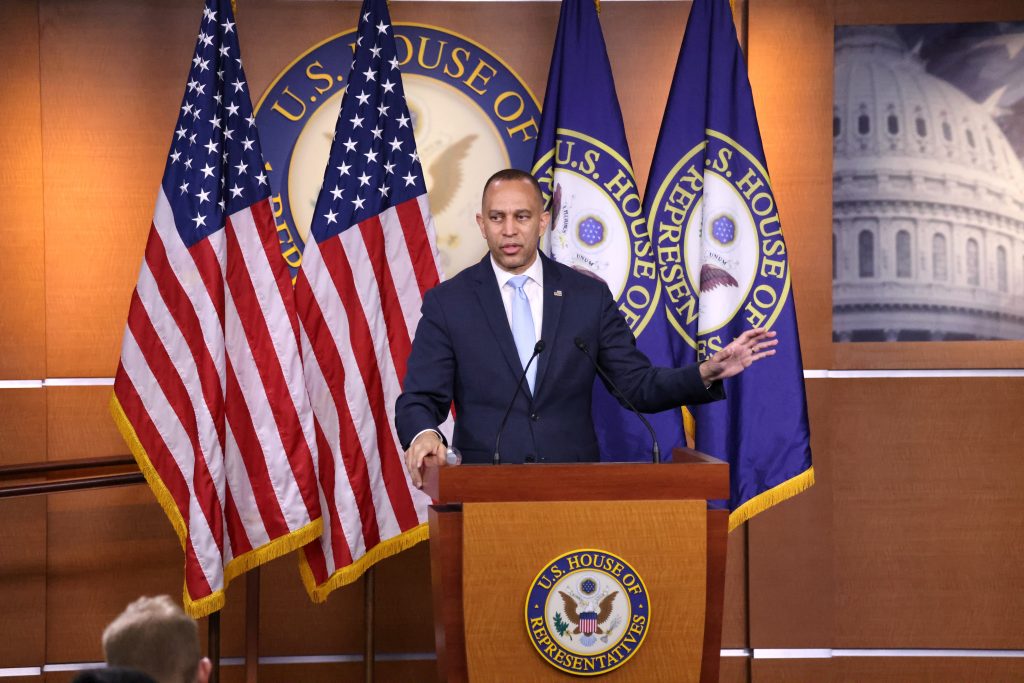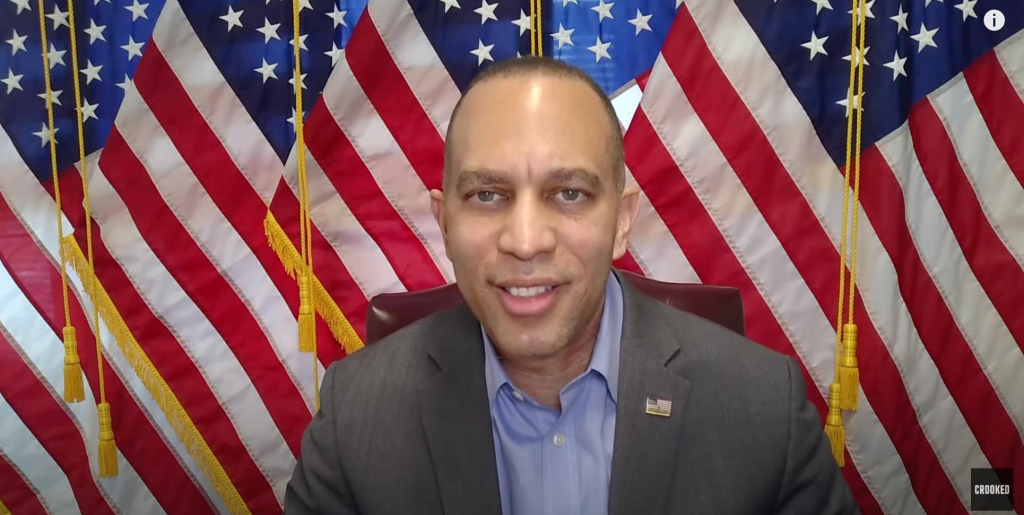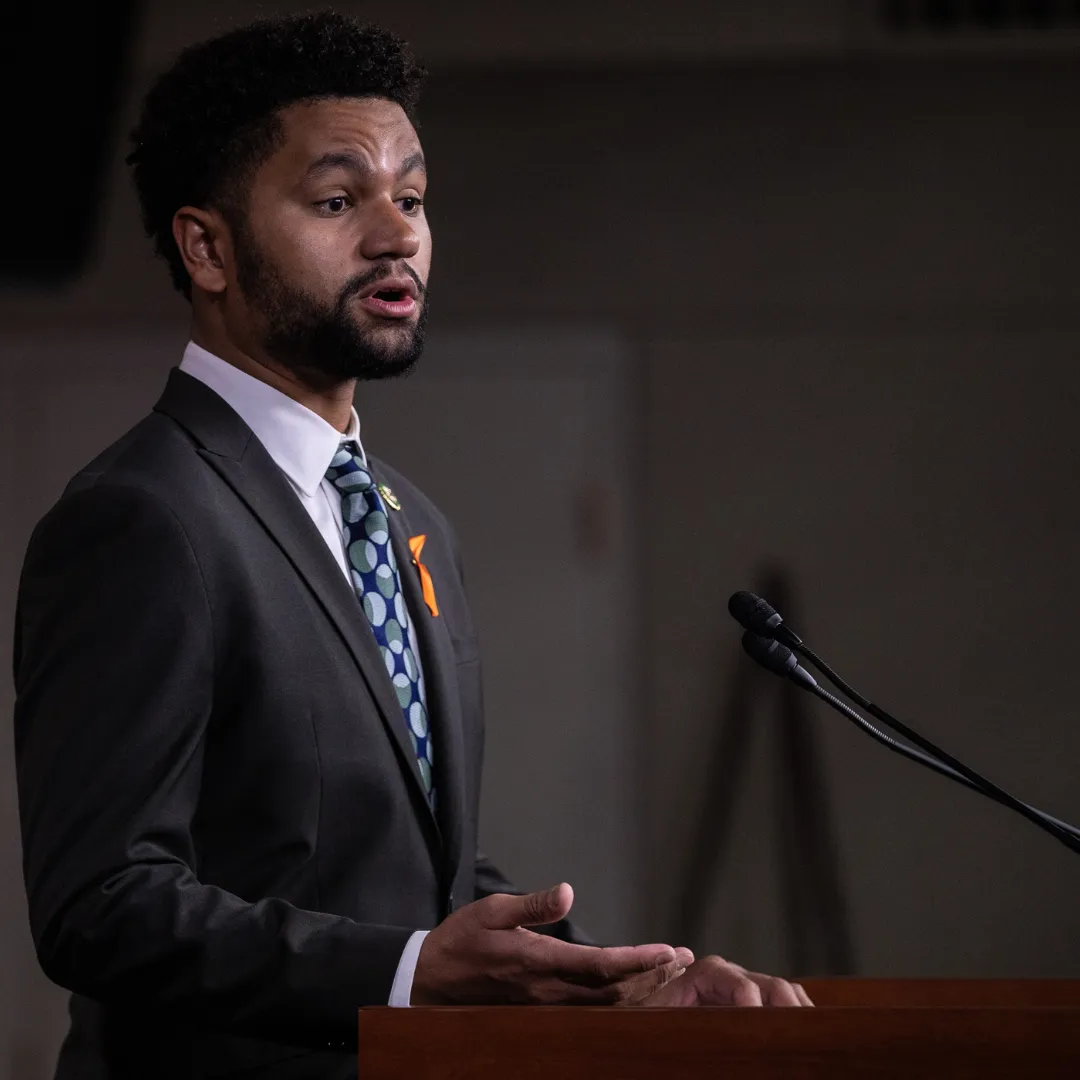
As Congress returns from its spring recess, a new wave of political conflict is surging across Washington over President Trump’s proposed domestic spending plans. House Minority Leader Hakeem Jeffries is leading the charge on behalf of Democrats, sounding alarm bells over what he characterizes as a dangerous and deadly vision for the future of American health care.
Jeffries, speaking to reporters at the Capitol on Monday, issued a stark warning regarding the Republican-led budget plans that would drastically cut federal funding for Medicaid.
According to the New York Democrat, the reductions proposed by the Trump administration would not just destabilize the country’s health care system but would directly endanger the lives of millions of Americans who rely on government-backed health coverage.
"They want to end Medicaid as we know it," Jeffries said. "They’re going to hurt children, hurt families, hurt seniors, hurt people with disabilities, close hospitals, shut down nursing homes — and people will die. This is a matter of life and death."
The political battle over Medicaid comes as both parties prepare for a high-stakes stretch of legislative activity. With Trump’s budget resolution recently approved by both chambers of Congress, committees are now moving to fill in the policy details behind the proposed $880 billion in spending cuts over the next ten years.
Analysts from the Congressional Budget Office have already indicated that a substantial portion of those cuts would almost certainly need to come from Medicaid to meet the target.
Republicans argue the proposed reductions are a necessary step toward reining in what they describe as runaway federal spending. They claim that the savings would be achieved primarily by rooting out inefficiencies and cracking down on fraud and abuse in the program, which currently provides health coverage to more than 70 million Americans.
However, Democrats dismiss these assurances as misleading and dangerous. They say the Republican proposals will inevitably result in sweeping service reductions, the closure of essential care facilities, and a loss of coverage for millions of low-income individuals and vulnerable populations.

The renewed debate is highlighting just how polarizing the issue of health care remains in the United States. For Democrats, Medicaid is a cornerstone of the social safety net, providing essential support to the elderly, disabled, children, and working-class families.
For many Republicans, however, it represents a bloated program in need of serious reform to ensure long-term sustainability.
As the Energy and Commerce Committee prepares to outline the specific cuts necessary to meet the budgetary targets, advocacy groups, public health organizations, and state officials are bracing for what could be one of the most dramatic overhauls to a federal health program in modern history.
Democratic lawmakers used the spring recess to organize hundreds of events nationwide in an effort to bring attention to the potential consequences of the proposed Medicaid cuts. Jeffries, in his remarks, pointed to the contrast between the two parties’ outreach efforts.
While Democrats held town hall meetings, public forums, and listening sessions across the country, Republicans largely avoided similar engagements with constituents.
"These extremists — they want to take health care away from the American people," Jeffries said. "And they know that their constituents aren’t here for it, which is why Republicans have been on the run during the last two weeks during the district work period."
"Democrats are leaning into town hall meetings all across America. Republicans are running away from them. But now there’s a moment of accountability."
The GOP’s avoidance of public town halls has not gone unnoticed. In many districts, Democratic lawmakers and candidates have filled the void, appearing in Republican-held areas to discuss the potential consequences of Trump’s proposed health care policies.

These appearances have attracted significant media attention and energized grassroots organizers, some of whom see the health care fight as a defining issue heading into the next election cycle.
While Republicans insist that their plans will strengthen Medicaid by making it more efficient, recent polling suggests that skepticism is not confined to Democratic voters.
Surveys indicate that many Republican voters are also wary of large-scale cuts to Medicaid, especially when the consequences could include the reduction or elimination of services they or their families rely on.
This political vulnerability has led to internal tensions within the Republican caucus. While party leaders remain committed to the budget framework, some rank-and-file members have expressed concern about the optics — and the consequences — of supporting a plan that could alienate a large segment of their base.
Democrats are hoping to exploit that tension. Although they currently lack the votes to stop the budget through legislative means, they are betting that public pressure, media scrutiny, and constituent outrage could be enough to convince some Republican lawmakers to break ranks.
"Now is the moment of truth," Jeffries said. "Will a handful of House Republicans step up on behalf of the American people and prevent the largest Medicaid cut in American history? Now is a time to choose."
The political implications of the Medicaid debate are enormous. Trump’s budget, passed through the special reconciliation process, cannot be filibustered in the Senate, which gives Republicans a procedural advantage.
But even within that advantage lies political risk. As Democrats continue to hammer the issue in public forums and in the media, Republican lawmakers face a growing backlash, particularly in swing districts where Medicaid is widely used and deeply valued.

In many rural areas, for instance, Medicaid funding is essential to keeping hospitals and clinics open. Reductions to that funding could have catastrophic ripple effects, leading not only to health care deserts but also to economic hardship, as local health systems often serve as major employers.
The same is true in nursing homes, where Medicaid covers a significant portion of long-term care for elderly Americans. Without adequate funding, many of these facilities could be forced to close or drastically reduce services, placing additional strain on families and caregivers.
In cities, meanwhile, Medicaid supports a broad array of public health programs, mental health services, and care for children in low-income neighborhoods. Cuts to these services would disproportionately impact already marginalized communities, raising questions about equity and justice in national policy decisions.
Health care professionals have also voiced strong opposition to the proposed budget. Hospital associations, medical groups, and state health departments have all issued statements warning that the cuts would undermine public health, increase uninsured rates, and raise costs across the system.
These groups argue that preventive care provided through Medicaid saves money in the long term by reducing emergency room visits and managing chronic conditions more effectively.
For many Americans, however, the debate is not about policy mechanics or budget line items. It is about real-world consequences. Families who depend on Medicaid for a child's cancer treatment, a parent’s nursing care, or a relative’s mental health support are watching this legislative battle unfold with anxiety and fear.
Jeffries and other Democratic leaders are working to channel that concern into political action. In speeches, press conferences, and digital campaigns, they are framing the Medicaid cuts not just as a budgetary decision but as a moral test for the nation.
"This is not an academic debate," Jeffries said. "This is not a theoretical exercise. This is about people’s lives. It is about who we are as a country and what we believe in."

Whether that message will resonate broadly enough to alter the trajectory of the Republican budget plan remains to be seen. But one thing is clear: the fight over Medicaid has once again become a central battleground in the nation’s ongoing struggle over the role of government, the meaning of public health, and the responsibilities of leadership.
With both sides preparing for a heated summer of legislative maneuvering and public outreach, the fate of Medicaid — and the millions of people who depend on it — hangs in the balance.



